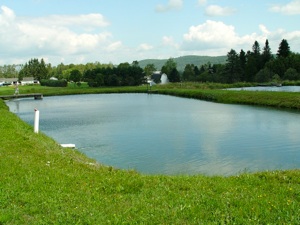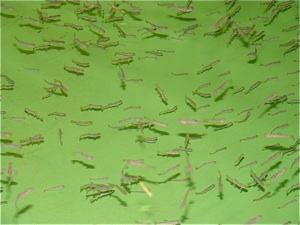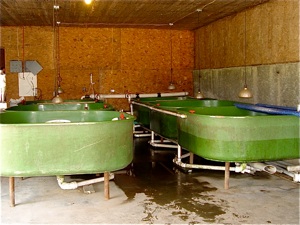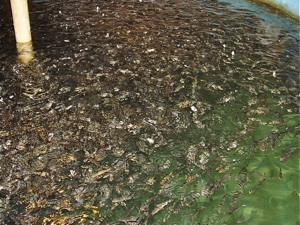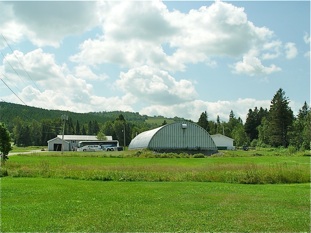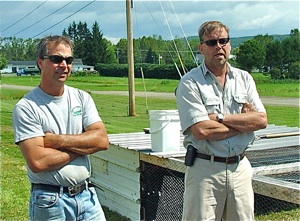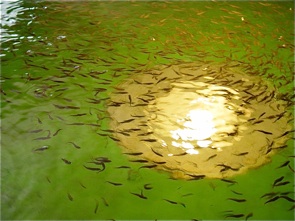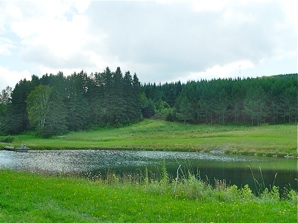Name: Mountain Springs Trout Farm
Address: Gary Picard
Mountain Springs Trout Farm
6 Picard Avenue
Frenchville, Maine 04745
Phone: 207-543-6887
Email: mtsprings@roadrunner.com
Products and Services:
-brook trout & rainbow trout farm
-several ponds -recreational fishing
-fully-equipped hatchery
-raised arctic char for Big Reed project
-raising arctic char for Wadleigh project
-private and public stocking of trout
-tree farm
What Makes Mountain Springs Trout Farm Unique?
It might come as somewhat of a surprise that the largest private brook trout hatchery in the state of Maine is located in the middle of potato country in the small town of Frenchville in Aroostook County. The hatchery is owned by Gary Picard. He and his eight brothers grew up on a potato farm, but all that changed when his parents, Philip and Yvette Picard, decided to give up potato farming in 1981, and establish a hatchery.
Philip Picard was an avid fisherman. He realized that the spring-fed pond on his property that yielded fifty gallons of water a minute would be an ideal spot to raise fish. As Philip and Yvette’s interest in establishing a fish farm increased, they decided to check out various hatcheries for technical advice in neighboring Quebec with Gary, their youngest son, in tow. They basically taught themselves how to operate a successful fish hatchery and passed on their knowledge and experiences to Gary.
After the fish farm materialized, Gary helped out for years before it was taken over by a salmon corporation who wanted a fresh water hatchery to raise the smolt. Gary decided to move to Connecticut for a few years and pursue a career in construction, but he found that he missed Maine. He headed back home when the salmon company went bankrupt and the hatchery reverted back to the family in 1994. Gary took over the management of the hatchery in 1996.
Running a hatchery is a seven-day-a-week commitment every day of the year. The fish need to be fed and monitored on a daily basis. In the winter the hatchery buildings need to be heated and this is accomplished by using the wood which Gary has harvested. Mt. Springs Trout Farm also includes a 300-acre tree farm whose woodlot is managed by Gary. The trees he harvests are either sold for pulp or sawlogs.
During the winter, the fish slow down and feed less. That all changes during the other seasons when feedings take place several times a day. A local student has helped Gary the past few summers, but he has graduated, so Gary will be looking for someone to lend an extra hand at the fish farm. In the warmer months when an extra supply of fish is available, Gary opens up some of the five outside fish ponds for recreational fishing for the public. Visitors can rent a fishing rod and purchase worms. One of the ponds, which is more wild, has been set aside strictly for catch and release.
For the past several years, Gary has been collaborating with Frank Frost, a Fisheries Biologist, and other members of the Maine Department of Inland Fisheries and Wildlife with the restoration projects at Big Reed Pond and Wadleigh Pond. The Picards have always been more than willing to embrace any of the new state-mandated environmental regulations and have had a good rapport with the state-run hatchery programs. Gary was extremely pleased when Mt. Springs Trout Hatchery was asked to participate in the arctic char restoration project.
Arctic char are also known as blueback trout.
They are a rare species of fish whose native population is only found in twelve locations in the continental United States. Biologists became concerned when it was realized that Big Reed Pond in T8 R10 WELS, a remote area of Penobscot County, was losing its arctic char population because of the illegal introduction of smelts in the water.
The situation at Big Reed Pond became so critical that it was decided that a major pond reclamation plan would have to be set in place. The biologists attempted to catch char from the pond and transport them to Gary’s hatchery. These captured char would become the brood stock to help with the establishment of future generations of char. Gary also agreed to raise brook trout for Big Reed Pond.
A very time-consuming and energy-intensive plan was set in motion to reclaim the one-hundred acre Big Reed Pond. Due to its remoteness, people are flown into the area by float planes. It was decided that vast quantities of Rotenone would have to be applied to every part of the pond in October of 2010, to wipe out the invasive fish populations. Frank Frost and several other employees of the Maione Department of Inland Fisheries and Wildlife, several volunteers, pilot Igor Sikorsky, and members of the Army National Guard, with their Black Hawk helicopters, assisted with the complex operation.
In the spring of 2011, thanks to Gary Picard’s fish farm, six hundred arctic char (of seven to nine inches in size) were reintroduced to Big Reed Pond. A fascinating video about all the efforts that went into the reclamation project was produced by the Department of Inland Fisheries and Wildlife. It is entitled “The Reclamation of Big Reed Pond” and it can be viewed on youtube.
The Maine Department of Inland Fisheries and Wildlife has recently been busy with the reclamation of Wadleigh Pond, located in T8 R15 WELS. It is a 157-acre pond with a similar scenario of illegal rainbow smelts competing with the arctic char for food and habitat. In the fall of 2013, Gary Picard and biologists stocked Wadleigh Pond with approximately 650 char fingerlings, and 3,5000 brook trout fingerlings and two adult char.
Over the years, Gary has built up a large client base for the public and private stocking of brown trout and rainbow trout. He is licensed to operate in the raising of over 200,000 trout per year. He explained that one of the most enjoyable features of his job is the opportunity to visit so many unique locations where his fish are stocked. He explained that some of the properties range from “puddle-size” to massive bodies of water. His fish have been sold throughout Maine, New Hampshire, Vermont, Massachusetts, and even to Pennsylvania.
Because he is located so far from many of the fishery workshops that take place in Maine, Gary spends a great deal of time reading various journals and going online to access the latest developments in fish farming. He is a 2014 member of the Maine Aquaculture Association. He shared that he has been tempted over the years to sell his fish farming operation at times if the right purchaser came along. Gary discussed how the farm property has been in the Picard family for about 150 years and he has felt an obligation to continue the farming legacy and pass it on to his children.
With the arrival of spring, the responsibilities at the hatchery will intensify and the sales of fish will increase. Gary and his wife, a teacher, and their two children, look forward to the arrival of a new child in June, so the warm weather is greatly anticipated with much excitement on many different levels. Another Picard will be part of the Mt. Springs Trout Farm that was established through the dedication and efforts of Philip and Yvette Picard and that is now being carried out so conscientiously through the work of their son, Gary Picard.






